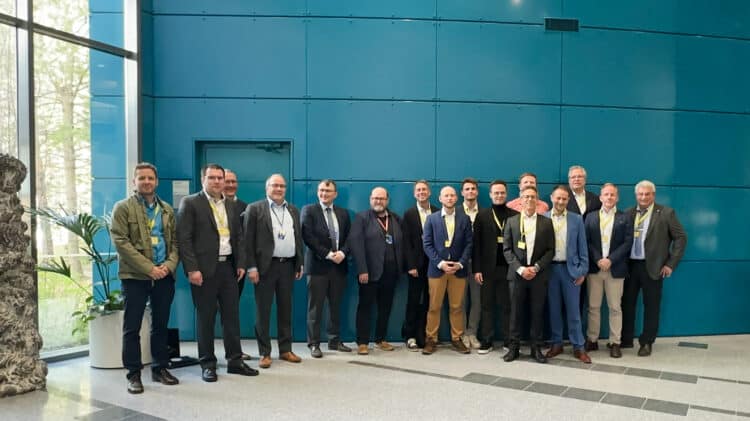
German Delegates Explored Oulu’s Research Frontier
Yesterday saw a spark of international exchange in Oulu as a delegation from Baden-Württemberg, Germany, landed at the University of Oulu. This group, including members of parliament and leaders from key industries like energy and e-mobility, arrived eager to explore potential partnerships and Finnish research. Led by Dr. Ralf Dietrich, who served as their spokesperson, they aimed to get a close look at groundbreaking work, particularly in areas like hydrogen, 6G, cybersecurity, and carbon accounting.

Rector Arto Maaninen presenting the University of Oulu’s research profile to the Baden-Württemberg delegation.
Rector Arto Maaninen welcomed the visitors, describing a truly expansive university. The University of Oulu spans natural sciences, life sciences, humanities, and medicine. One of the university’s key strengths is the early and ongoing connection between its tech and medical departments, which Maaninen called “a real benefit for us.” He highlighted the university’s pull in the region, noting its status as “a university for half of Finland,” with over 14,000 students, a dedicated staff, and a strong alumni network. Maaninen also touched on the university’s core research priorities: tackling climate change and protecting nature, building a safer society, putting digital tools and AI to work for people, and boosting human health.
Leading the Wireless Revolution
A significant presentation during the visit detailed the University of Oulu’s globally recognised 6G Flagship programme. Professor Ari Pouttu, one of the driving forces behind this effort, explained that this pioneering programme, the first of its kind, is already shaking things up with its comprehensive plan for the next wireless generation. Pouttu pointed to the programme’s collaborative spirit, noting, “Over the duration of the project, it has involved close to 600 people from basically all over the world.”

Professor Ari Pouttu, 6G Flagship’s Vice Director, discusses the impact 6G Flagship’s research has had within the future wireless community.
6G Flagship’s early impact is clear. According to Pouttu, its widely downloaded white papers are shaping the global conversation around 6G, covering not just the tech itself but also business strategy, regulations, and environmental impact.
Pouttu outlined the programme’s four key research areas. These range from improving wireless connections for a future packed with smart devices to boosting device and circuit tech past 100 GHz. They’re also tackling how to bring smarter computing closer to users and developing AI that thinks on its feet for fast-moving networks. The university’s on-campus 5G testbed, constantly evolving towards 6G, showcases its commitment to hands-on research with innovations like smart surfaces that can bend signals.
Science Meets Finance
The delegation gained dual insights into sustainability from both scientific and financial angles.
Professor Ulla Lassi, Director of the Sustainable Chemistry Unit, showcased Oulu’s leading work in sustainable chemistry and the circular economy. Her research covers critical areas like advanced battery materials and recycling, as well as innovative hydrogen production through methane pyrolysis. Lassi emphasised finding practical industrial solutions, stating, “It’s not enough for it to just be in the strategy; that strategy must turn into practical actions.”
Professor Janne Järvinen, Dean of the Business School, presented research on carbon accounting, highlighting its growing importance for industrial corporations’ financial functions. The research explores how companies can quantify and integrate carbon-related KPIs into their operations and investment analyses. The increasing demand for green and sustainability bonds necessitates credible carbon footprint measurements. Internal carbon pricing is emerging as a tool for investment analysis, and allocating carbon content to products is becoming crucial for demonstrating low-carbon offerings.
Eye on the Cyber Frontier
The visit wrapped up with a compelling discussion by Professor Kimmo Halunen on the growing importance of cybersecurity. A professor at both the University of Oulu and the National Defence University, he stressed that as our energy grids get smarter and more connected, strong digital defences are essential. He pointed to recent incidents, like conflicts knocking out satellite communications crucial for renewable energy, or finding hidden flaws in industrial kit like power inverters that contain undocumented communication features.

Professor Kimmo Halunen is discussing cybersecurity with the Baden-Württemberg delegation.
Halunen emphasised that cybersecurity is deeply rooted in human trust and how we understand the digital world. As he put it, “technology alone won’t be enough.” He highlighted the University of Oulu’s SafeEarth project, a collaborative effort pulling in experts from space science and the humanities. They work to understand security threats from all sides, from hackers to solar storms, with the aim of building reliable systems for the future.
Building Bridges for Future Collaboration
The University of Oulu’s hosting of the Baden-Württemberg delegation offered an introductory overview of its work in forward-thinking technologies like 6G, cybersecurity, and hydrogen energy. The visit was a valuable first step, opening the door for potential future exploration of collaborative opportunities in these crucial fields.